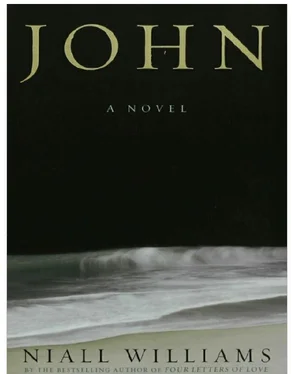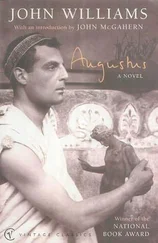Matthias leans forward; the zeal of his words carries him. His brows are brought together in a deep furrow. Impatiently he waves a thin-fingered hand in the air as if warding off a bird.
'What was to gain by that? How many more followers might we have if at that moment he had shone forth with blinding light? If he was truly the Son of God and had been able then to strike,' he fists a hand, smacks it to the other, 'if enemies and unbelievers were made to fall to their knees then, and he proved himself the Almighty?'
He draws his stool closer; his voice is throaty now with passion. 'Think, Prochorus, what would have been then. Think of how he may have thrown off the cross like a stick, how he may have risen in air clothed in light and all would have seen and believed. Believed, Prochorus. Think of it. All would have believed, and for all time. We, his followers, would not have been persecuted. Despised by the world. We would have been honoured. And would the Son of God not want that? Would he not know that by showing himself then and not hanging on the cross all would have known it to be the truth: that Jesus of Nazareth was the Son of God? And none could deny it. His followers would have outnumbered Roman legions. So why, Prochorus? Why then did Jesus not do this? Did he want us to suffer? To be hated? Flogged at the walls of synagogues? To be banished by Roman emperors to live on such a barren rock as this?'
Prochorus does not answer. He palms his bald head. His brow is bubbled with sweat, a furious itch is on his cheek and neck. He works at it. He wants water, but has not time to ask before Matthias says, 'What is the answer? How can it be explained?' He taps his fingertips together, a tent in desert wind. 'My learned friend, I will tell you. Jesus of Nazareth was not the Son of God, but a man like you or I. When he reached the age to be useful to our Lord, God descended upon him so that he might do his works. Christ did not come in the flesh, but in spirit. And so, too, God departed from him and left Jesus before Calvary. And Jesus knew this. He was again a man. He cried out as much. The power of the Lord, the spirit, had gone from him, as from all of the prophets. He suffered, he died on the cross, Prochorus. He could not shine forth or throw off the cross, because he was as you or I then and could do nothing. Do you see?'
The light in the hut is low. The wind is gone away. There is curious stillness, on the damp sand floor a converse of flies.
'I need water,' Prochorus says.
The other does not move. His eyes are fixed on the scribe.
Prochorus works the itch on his right cheek. 'Matthias, a drink,' he gasps. 'Water.'
'Water, yes,' Matthias stands and from a table behind him lifts the water bag, holds it. 'You are learned, Prochorus. You are knowledgeable, able to discern truth. I respect you. That is why I have spoken.'
The scribe's hand is reached out, the water not yet given.
'As the Lord visited Jesus, Prochorus, so, too, he can visit himself upon others. You know this. We are not meant to remain here. It is not the Lord's intention. We who follow him have been chosen, and are free from sin, and must not live uselessly here in banishment. Prochorus,' Matthias whispers, 'J know this to be true' Then he gives the scribe the water bag.
Prochorus drinks. His eyes are already fevered, the side of his face red with rash. And whether because he sees this or he judges he has risked enough for now, Matthias says no more. He sits on the stool, tents his fingertips. No wind at all blows.
I hated them for wanting always a sign. 'What sign can you show us?' Always asking. 'Go on, a sign, a sign!'
I did not need a sign. I believed.
You know I did.
We went up to Jerusalem when Passover was near. A dry season. In the temple precincts the animal sellers, the coin changers changing the denarii and drachmas to pay the temple tax of a half-shekel. Calling out their rates to those approaching. Oxen in the passages, sheep, cages of doves. Noise of trading. Hot sun. The long journey we had walked to come there.
When we come to the temple, something will occur, I thought.
On the long walk up the hillsides you did not speak. You walked swiftly. I was by your side.
When we came, they had already heard of you. Their murmurs we heard: 'That is him! That is Jesus, the one who did those things. They follow him. Look!'
And some called your name, and others asked did we want strong oxen, fat sheep, cheap rates for coin changing. They pulled at your sleeve. I struck one in the face. James another. He kicked a table of coins. Spilling in the sunlight. The cries of the animals, the sellers waving their hands. James with his hands about the neck of another.
Because we had imagined it otherwise. Because we had walked that long walk up the dry hillsides, thinking, Behold, the Son of God comes to Jerusalem.
And we, the chosen, alongside him.
But no glory was in this. Dirt and noise and fighting. A man pulling me back, striking me.
Another standing before you offering a jewelled brooch, pulling at your garments. Thinking because we were your many servants that you were wealthy.
You bent down to the bedding of the oxen and entwined the straw and reed to make a whip of cord. Raised it in the air.
The only time I ever saw your anger.
James and I and Philip and Andrew wild with fighting, furious as beasts.
You were ashamed, I thought. Of them. Of us, too. And knelt down in that deserted passageway of the temple.
To repent.
For the glory of the Father could not be won that way.
In two days the sellers and the coin changers would be back. You knew that. You knew and knelt and knew already the history of what was to come.
The merchants went running to the chief priests and the elders and told them of you, how the people would not be able to pay the temple tax if there were no coin changers.
And the chief priests came and asked, 'What sign can you show us, authorising you to do these things?'
I confess, Lord, I, too, wanted a sign then. I wanted them struck down, made lame, prostrate on the ground before you.
You placed your hand on your chest. 'Destroy this temple, and in three days I will raise it up.'
We did not understand then. No more than the priests. I looked at the temple walls. I expected you would make them fall by raising your hand. Such was my belief.
Such was my love.
'Master?'
'Papias. I hear in your voice you are recovered.'
'I have brought a bowl of lentil pottage. Master, will you eat?'
'My thanks.'
It is mid-morning. John sits near the cave entrance, his white head tilted back, brown blind eyes open to the weak sun. There is a little wind. Before him the island prison is stilled and empty, bleak rock and brooding sea.
The young disciple carries a small wooden bowl, places it in the Apostle's hands, sits by him while he eats. Papias has told none that John was in mid-sea when he found him. For in the aftermath of the rescue he was not sure himself what he saw. He has said only that he came upon the Apostle wandered down by the shore. He has not said he himself was drowned and found by his blind master in the deep waters, for the puzzle of what happened is too profound and unclear in his mind.
'Your foot is lame?'
'It is a small thing, Master.'
'I hear you limp.'
'It will be soon healed.'
John spoons the pottage, the lentils long soaked and thick and savoured with fish tails and herbs.
'I have been weak, Papias,' he says. 'I have surrendered to impatience.'
'You are our master. If you are weak, we are weaker. You are the beloved disciple of the Lord himself,'
Do not call me that. I am no more beloved than another — all are beloved.'
Papias purses his lips, does not ask the question he wishes to, what the Apostle was doing in the tide. He is filled with restlessness, wild birds of the unasked, the untold. His hands tap softly on his thighs. He studies his wounded foot, raised lips of scar, sandgristled. He wants to tell of the woman Marina and her dead children and her belief she is with demons, but feels a cloud of guilt over it. He did nothing wrong; he stayed with the woman, he prayed for her, he prayed for her children safe passage to heaven. But still, in him is guilt and restlessness.
Читать дальше










